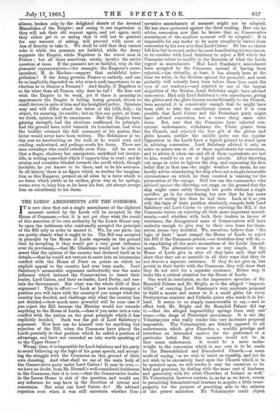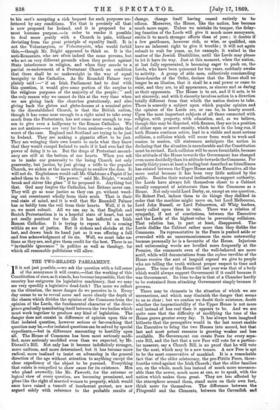THE LORDS' AMENDMENTS AND THE COMMONS.
IT is now clear that not a single amendment of the slightest moment carried by the Lords will be accepted by the House of Commons,—but it is not yet clear what the result
of this assertion of its own authority by the Lower House may be upon the noblemen who confessedly accepted the principle .of the Bill only in order to amend it. We, for our parts, can see pretty clearly what it ought to be. The Bill was accepted in principle by the House of Lords expressly on the ground that by accepting it they would get a very great influence over its provisions,—that Mr. Gladstone would not be able to assert that the opinion of the country had declared itself as to details,—that he would not venture to enter into an internecine conflict with the House of Peers on points on which no explicit appeal to the country had ever been made. Lord Salisbury's memorable argument undoubtedly was the main influence which induced the Conservatives to desert their leader, Lord Cairns, and their ex-leader, Lord Derby, and sus- tain the Government. But what was the whole drift of that argument ? This in effect Look at how much stronger a position you will have with the country if you accept what the country has decided, and challenge only what the country has not decided,—how much more powerful will be your case if you reject the Bill, because the Minister would not concede anything to the House of Lords,—than if you enter into a vain .conflict with the nation on the great principle which it has explicitly decided.' Such was the gist of Lord Salisbury's .argument. Now how can he himself vote for anything but rejection of the Bill, when the Commons have placed the Lords precisely in that position which he called a position of advantage, and have not conceded an iota worth speaking of to the Upper House ?
We say, then, it is impossible for Lord Salisbury and his party to avoid following up the logic of his great speech, and accept- ing the struggle with the Commons on this ground of their own choosing. And what shall we say of the main body of the Conservative party under Lord Cairns? It may be true,— we have no doubt, from Mr. Disraeli's well-considered feebleness in the Commons, that it is true,—that the Conservative leader in the Lower House is sick of the question, and would use any influence he may have in the direction of retreat and concession. But what can Lord Cairns do He advised rejection even when it was still uncertain whether Con-
servative amendments of moment might not be adopted. He has since protested against the third reading. How can he advise concession now that he knows that no Conservative amendment of the smallest moment will be adopted ? It is impossible for any leader to be more completely barred from concession by his own acts than Lord Cairns. He has no choice left him but to recant under the most humiliating circumstances, or to combine with Lord Salisbury to reject a Bill which the Commons refuse to modify in the direction of what the Lords regard as amendments. Had Lord Stanhope's amendment been accepted by the Commons, instead of having been rejected,—(as virtually, at least, it has already been at the time we write, in the division against the preamble, and most probably will actually have been before these lines meet the eyes of our readers),—and rejected by one of the largest majorities of the Session, Lord Salisbury might have advised concession. Had only Lord Salisbury's own amendment, giving the glebes and the glebe houses unconditionally to the Church, been accepted, it is conceivable enough that he might have been able to take the conciliatory course, and it is even possible that Lord Cairns and the Protestant party might have advised concession, lest a worse thing came unto them. But, now that the Commons have rejected con- current endowments, withdrawn the Ulster grants from the Church, and rejected the free gift of the glebes and glebe houses, neither the middle party nor the regular Opposition in the Lords have a logical ground to stand upon in advising concession. Lord Salisbury advised it only on order to secure one or all of these equivalents for concession, and to advise it when one and all of these equivalents are lost to him, would be an act of logical suicide. After throwing out cargo in order to lighten the ship, and expressing his firm belief that in that case she might weather the storm, he can hardly advise abandoning the ship when not a single favourable circumstance on which he then counted is wanting for the prosecution of the voyage. Still less can the commander, who advised against the throwing out cargo, on the ground that the ship might come safely through her perils 'without a single sacrifice, go in for abandoning her now that he has more chance of saving her than he had then. Look at it as you will, the logic of their position absolutely compels both Lord Salisbury and Lord Cairns to advise rejecting the Bill, if the Commons insists on rejecting all their more important amend- ments,—and whether, with both their leaders in favour of resistance, the disorganized mass of Conservatives will have audacity enough to give way to their own fears for them- selves, seems very doubtful. We, ourselves, believe that "the logic of facts" must compel the House of Lords to reject the Bill if the Commons persist,—as doubtless they will do,— in repudiating all the more momentous of the Lords' Amend- ments. The alternative seems to us very simple. If the House of Lords give in after all they have said, they will show that they are so unstable in all their ways that they do not deserve a separate existence. If they do not give in, but persist in their battle with the Commons, they will show that they do not tvisla for a separate existence. Either way, it • looks like a critical situation for the House of Lords.
One word in conclusion, on the impressive speeches of Sir Roundell Palmer and Mr. Bright, as to the alleged " impossi- bility " of carrying Lord Stanhope's very moderate proposal to build a manse and annex to it a small glebe for every Presbyterian minister and Catholic priest who needs it in Ire- land. It seems to us simply unanswerable to say,—and in effect both Mr. Bright and Sir Roundell Palmer did say. it,—that the alleged impossibility springs from only one cause,—the dregs of Protestant ascendancy. It is not the Voluntaryists who really render this very moderate proposal impossible. The Voluntaryists are bitterly opposed to all endowments which give Churches a worldly prestige and introduce an interested motive for the preference of a particular belief. But this measure would not be in that sense endowment. It would be a mere make- weight to the concession which in any case is to be made to the Disestablished and Disendowed Church,—a mere mode of saying, as we wish to insist on equality, and yet do not wish to be excessively hard upon the Church which is to be operated upon, we will render it easy for ourselves to be kind and generous, by dealing with the same sort of kindness and generosity with the other Churches of Ireland as well.' No Voluntaryist, however austere, is, as far as we know, averse to permitting denominational trustees to acquire a little trust- property for the purpose of providing aids to the salaries of the poorer ministers. No Voluntaryist could object to his sect's accepting a rich bequest for such purposes un- fettered by any conditions. Yet that is precisely all that is now proposed for Ireland, and it is proposed for a most humane purpose,—in order to render it possible to deal more gently with a Church in pain, without deviating from the great principle of equality itself. It is not the Volnntaryists, as Voluntaryists, who would forbid this,—though Mr. Bright appeared to think so. It is the anti-Romanists, who are often indeed the same persons, but who act on very different grounds when they protest against State interference in religion, and when they accede to a partial re-endowment, of a Protestant Church on condition that there shall be no makeweight in the way of equal benignity to the Catholics. As Sir Roundell Palmer very plainly said :—" if an Irish Parliament had to deal with this question, it would give some portion of the surplus to the religious purposes of the majority of the people ; " and the only reason why we cannot do this at the very time when we are giving back the churches gratuitously, and also giving back the glebes and glebe-houses at a nominal price to the disestablished Church, is that the British nation, though it has come near enough to a right mind to take away much from the Protestants, has not come near enough to rea- son to give even a halfpenny to the Roman Catholics. We are not anxious—we are very far from anxious—to make the worst of the case. England and Scotland are trying to be just to Ireland. They are making a gigantic effort to be just. They are wringing their own hearts to undo what they know that they would compel Ireland to undo if it had ever had the power of doing it to us. But the dregs of Protestant ascend- ancy are still at the bottom of our hearts. When you ask us to make our generosity to the losing Church not only generosity, but justice, by just giving a trifle to the popular Church, we sicken at the mere attempt to swallow the dose. It will not do. Englishmen would call Mr. Gladstone a Papist if he asked them to do it. "His power," said Mr. Bright, "would break and shiver like glass" if he proposed it. Anything but that. God may forgive the Catholics, but Britons never can. They will go as near justice as they can go, without weed- ing out resentment wholly from their souls. That is their real state of mind, and it is well that Sir Roundel]. Palmer has so boldly torn the veil from their hearts. Well, if it be so, we must submit. All we can Bay is, that English and Scotch Protestantism is in a hopeful state of heart, but not yet really penitent for the ills it has indicted on Irish Roman Catholics. It is trying to repent. It is coming within an ace of justice. But it sickens and shrinks at the last, and draws back its hand just as it was offering a full and free acknowledgment of its sin. Well, we must take na- tions as they are, and give them credit for the best. There is an " invincible ignorance" in politics as well as theology, for which all reasonable politicians will allow.































 Previous page
Previous page